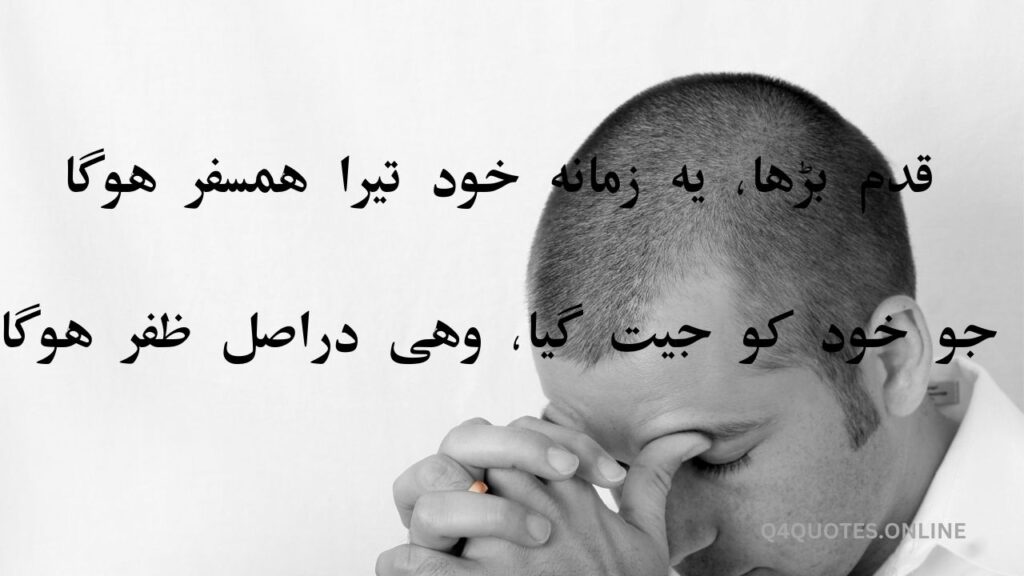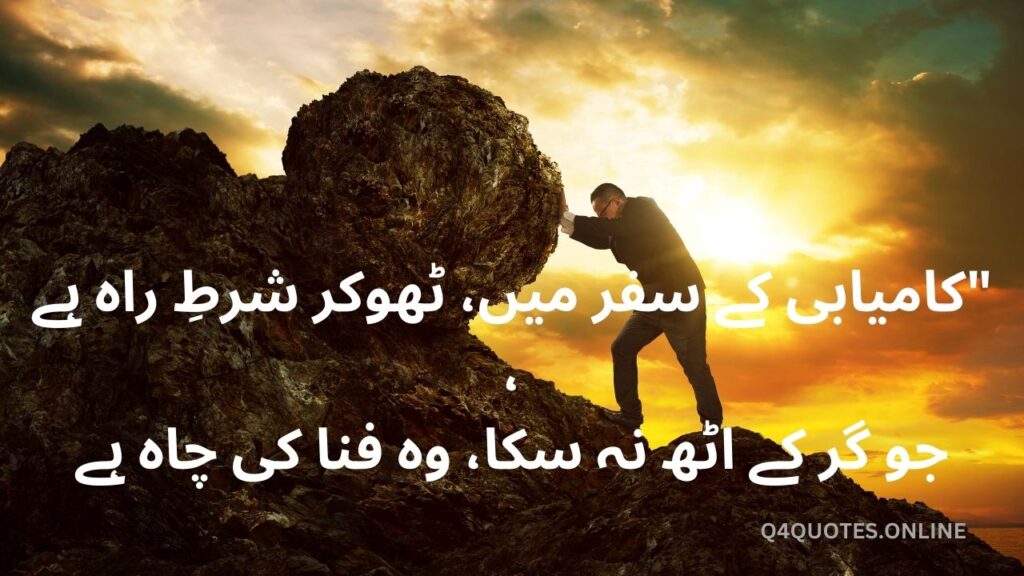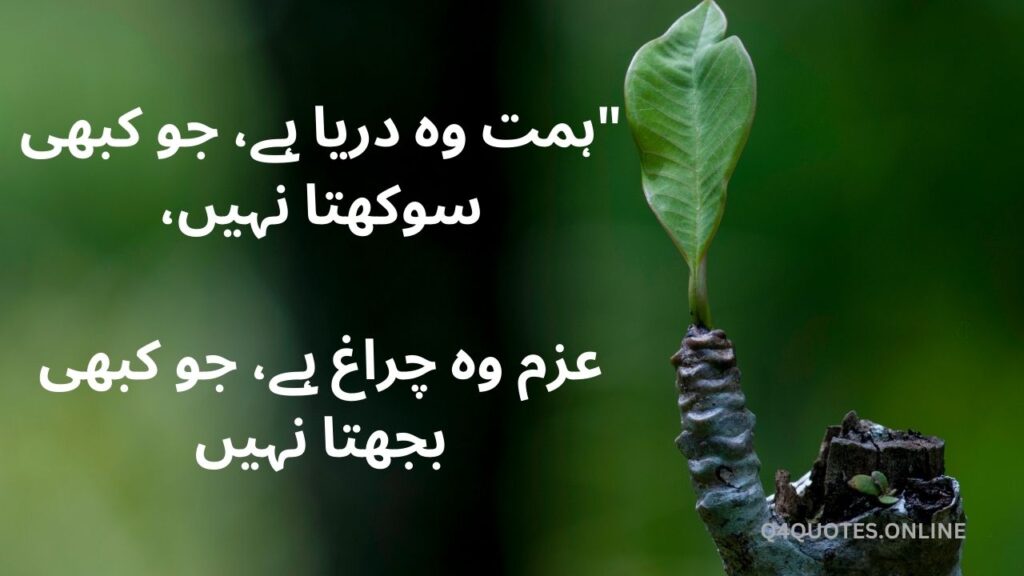Explore the profound themes of ambition, self-realization, and spiritual awakening in Allama Iqbal poetry. This in-depth analysis of three iconic poems delves into Iqbal’s philosophy of transcending worldly limitations, highlighting the timeless wisdom found in Allama Iqbal poetry in Urdu. Discover the essence of renunciation, leadership, and boundless possibilities through his visionary words.
Allama Iqbal Poetry: A Deep Dive into Three Masterpieces
Allama Iqbal, one of the greatest philosophers, poets, and visionaries of the 20th century, is revered for his revolutionary and thought-provoking poetry. Allama Iqbal poetry words carry profound messages that resonate with individuals from all walks of life, especially those in the Muslim world. In this article, we will explore three of Allama Iqbal’s iconic poems: “ستاروں سے آگے جہاں اور بھی ہیں” (There Are Other Worlds Beyond the Stars), “نہ تو زمیں کے لیے ہے نہ آسماں کے لیے” (You Are Neither for the Earth nor the Sky), and “مجنوں نے شہر چھوڑا” (Majnun Left the City). Each poem embodies Iqbal’s philosophy of self-empowerment, spiritual awakening, and transcending limitations. allama iqbal poetry having a soul healing property.
Allama Iqbal Poetry: “ستاروں سے آگے جہاں اور بھی ہیں” (There Are Other Worlds Beyond the Stars)
The Theme of Boundless Possibilities
In this remarkable poem, Iqbal presents a call for endless ambition. His words urge the reader to break free from worldly constraints and realize the limitless potential that lies ahead. The opening line of Allama Iqbal Poetry, “ستاروں سے آگے جہاں اور بھی ہیں,” is not only symbolic but also a metaphor for the horizons beyond the immediate and the apparent. It suggests that while humans may be tied to the world they know, there are countless realms yet to be explored.
Love as a Test
Iqbal views love as the ultimate test of the human spirit. In the second line, “ابھی عشق کے امتحاں اور بھی ہیں,” he conveys that life is full of trials and challenges, especially for those driven by love. But Iqbal’s concept of love is not merely romantic; it encompasses the love for God, for humanity, and for one’s purpose. This love challenges us constantly, pushing us beyond our limits to achieve greatness.
A Critique of Contentment
Iqbal warns against being complacent with the world of “color and scent” or material pleasures. He asks the reader not to be satisfied with the mundane and transient, emphasizing that “قناعت نہ کر عالم رنگ و بو پر، چمن اور بھی آشیاں اور بھی ہیں” (Do not be content with the world of color and scent; there are other gardens, other nests yet to be found). Here, Allama Iqbal poetry in Urdu pushes the reader to constantly strive for greater heights and not to settle for less.
Encouragement for Self-Discovery
The poem encourages self-discovery and self-realization, suggesting that one’s potential is not confined to a particular space or time. Iqbal’s imagery of the falcon, or “شاہین,” urges us to soar higher, to seek new skies, and to avoid becoming entangled in the routine of life. This philosophy of self-discovery, rooted in Allama Iqbal poetry, is one of the central themes of his work, making this poem a timeless piece of wisdom and inspiration.
Allama Iqbal Poetry: “نہ تو زمیں کے لیے ہے نہ آسماں کے لیے” (You Are Neither for the Earth nor the Sky)
Elevation Beyond the World
In this poem, Iqbal addresses the human spirit’s higher calling. The central message revolves around the idea that humans are not created merely for the earth or the sky. In the line “نہ تو زمیں کے لیے ہے نہ آسماں کے لیے، جہاں ہے تیرے لیے تو نہیں جہاں کے لیے,” Iqbal emphasizes that the world is for the human being to explore, dominate, and understand, not for the human to be bound by it. This reflects Iqbal’s vision of self-empowerment and spiritual awakening.
The Mind and Heart in the Flame of Love
Iqbal’s poetic vision often highlights the importance of both intellect and heart, but here, he contrasts the two, stating that the mind is tied to worldly concerns like thorns and debris, while the heart belongs to the flame of love. In “یہ عقل و دل ہیں شرر شعلۂ محبت کے، وہ خار و خس کے لیے ہے یہ نیستاں کے لیے,” he describes the heart as burning with the flame of divine love. This vivid metaphor represents the struggle between materialism and spiritualism, a recurring theme in Allama Iqbal poetry in Urdu.
Yearning for True Leadership
Another essential element of this poem is the concept of leadership. Iqbal laments that the stars, which once served as guiding lights for the traveler, now wait in vain for a true leader to emerge. His lamentation, “نشان راہ دکھاتے تھے جو ستاروں کو، ترس گئے ہیں کسی مرد راہ داں کے لیے,” is a reflection on the absence of true visionary leaders in society. This profound commentary resonates deeply within the context of Allama Iqbal poetry, urging readers to strive for true leadership rooted in wisdom and vision.
Spiritual Journey Beyond the Physical World
Finally, the poem concludes with an almost mystical acknowledgment of the soul’s higher calling. Iqbal speaks of a song within his throat, a “Naghma” (melody) that belongs to the realm beyond space and time—an acknowledgment that his soul and words are destined for the divine. This sense of transcendence is central to Allama Iqbal poetry, emphasizing that one’s true destiny lies beyond the material world.
Allama Iqbal Poetry: “مجنوں نے شہر چھوڑا” (Majnun Left the City)
The Theme of Renunciation
This poem delves into the idea of renunciation, symbolized by the legendary figure Majnun, who left the city in search of his beloved Layla. Iqbal uses this narrative to explore the theme of self-sacrifice for a higher purpose. In the line “مجنوں نے شہر چھوڑا تو صحرا بھی چھوڑ دے، نظارے کی ہوس ہو تو لیلیٰ بھی چھوڑ دے,” Iqbal suggests that if one’s desire is solely for the pleasure of sight, then even Layla, the symbol of ultimate beauty and love, should be forsaken. This idea of renunciation is key in Allama Iqbal poetry in Urdu, where spiritual fulfillment is often presented as the highest form of love.
Renunciation of Worldly and Spiritual Desires
Iqbal takes the concept of renunciation further by advocating for complete detachment from both worldly and spiritual desires. He argues that true renunciation means giving up not only the material world but also the afterlife, as reflected in the line “دنیا جو چھوڑ دی ہے تو عقبیٰ بھی چھوڑ دے.” This idea is central to his philosophy of selfless devotion, urging individuals to pursue a path of pure love and surrender to God.
The Critique of Blind Imitation
Iqbal criticizes blind imitation in the line “تقلید کی روش سے تو بہتر ہے خودکشی.” He argues that blindly following others is worse than death itself. Instead, he encourages independent thought and self-reliance, a recurring theme in Allama Iqbal poetry. By invoking the image of Khizr, the mythical guide of travelers, Iqbal suggests that even the wisest guides should be forsaken in favor of forging one’s own path.
Love and Pain as Essential Elements of Existence
One of the most powerful aspects of this poem is Iqbal’s emphasis on love and pain as essential components of existence. He argues that speech without the pain of love is meaningless and that if one is not a victim of love, then they should give up the restless stirring that defines a life of passion. The line “لطف کلام کیا جو نہ ہو دل میں درد عشق” beautifully captures this sentiment, highlighting the importance of love as a transformative force in Allama Iqbal poetry in Urdu.
Forsaking Institutions for a Higher Cause
Iqbal concludes the poem with a call to forsake traditional institutions such as the temple, the mosque, and the church in the pursuit of a higher spiritual path. In the line “بت خانہ بھی حرم بھی کلیسا بھی چھوڑ دے,” Iqbal emphasizes that true love for God transcends organized religion and institutional boundaries. This theme of transcending worldly structures is a defining feature of Allama Iqbal poetry, advocating for a direct, personal connection with the divine.
Conclusion
Allama Iqbal poetry in Urdu is an extraordinary blend of philosophy, spirituality, and social commentary. The three poems discussed here reflect his profound belief in self-reliance, spiritual awakening, and transcending the material world. From encouraging readers to explore new horizons in “ستاروں سے آگے جہاں اور بھی ہیں” to advocating for complete renunciation in “مجنوں نے شہر چھوڑا,” Iqbal’s poetry continues to inspire and challenge readers to seek higher truths and deeper meanings in life. Through these poems, Iqbal leaves a lasting legacy, encouraging the pursuit of both worldly and spiritual fulfillment while always striving for a connection with the divine.
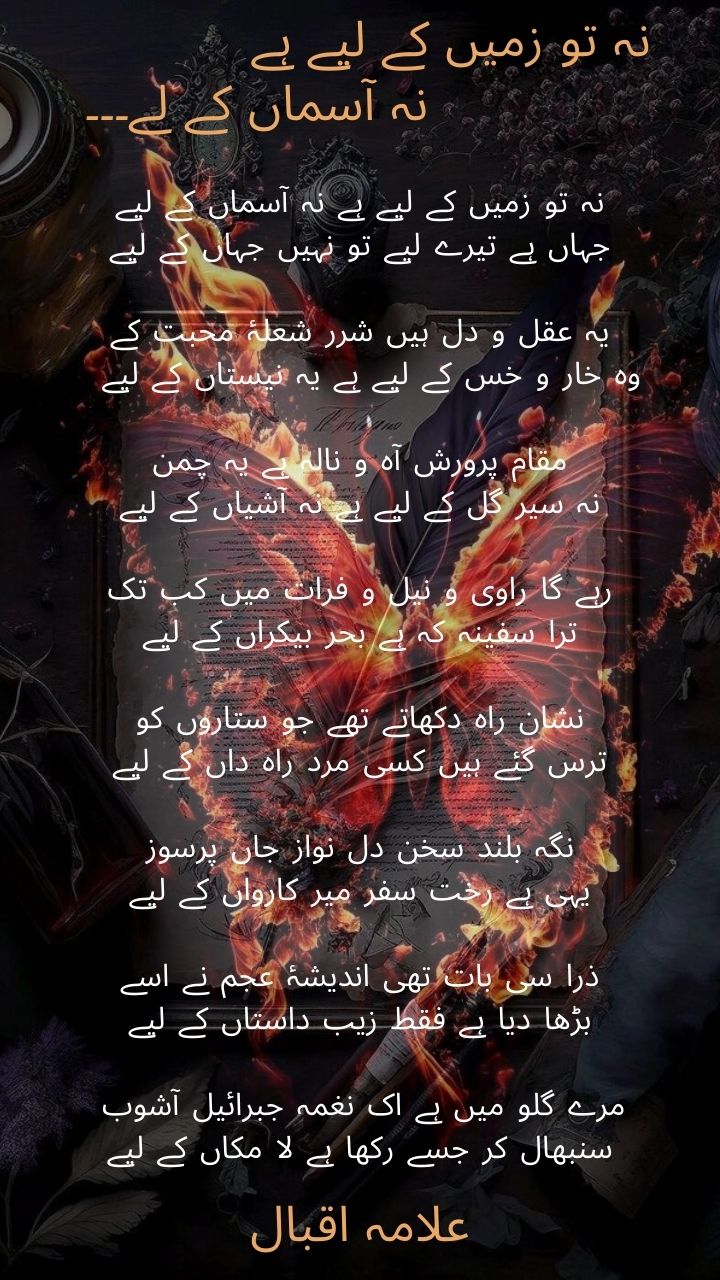
نہ تو زمیں کے لیے ہے نہ آسماں کے لیے
جہاں ہے تیرے لیے تو نہیں جہاں کے لیے
یہ عقل و دل ہیں شرر شعلۂ محبت کے
وہ خار و خس کے لیے ہے یہ نیستاں کے لیے
مقام پرورش آہ و نالہ ہے یہ چمن
نہ سیر گل کے لیے ہے نہ آشیاں کے لیے
رہے گا راوی و نیل و فرات میں کب تک
ترا سفینہ کہ ہے بحر بیکراں کے لیے
نشان راہ دکھاتے تھے جو ستاروں کو
ترس گئے ہیں کسی مرد راہ داں کے لیے
نگہ بلند سخن دل نواز جاں پرسوز
یہی ہے رخت سفر میر کارواں کے لیے
ذرا سی بات تھی اندیشۂ عجم نے اسے
بڑھا دیا ہے فقط زیب داستاں کے لیے
مرے گلو میں ہے اک نغمہ جبرائیل آشوب
سنبھال کر جسے رکھا ہے لا مکاں کے لیے
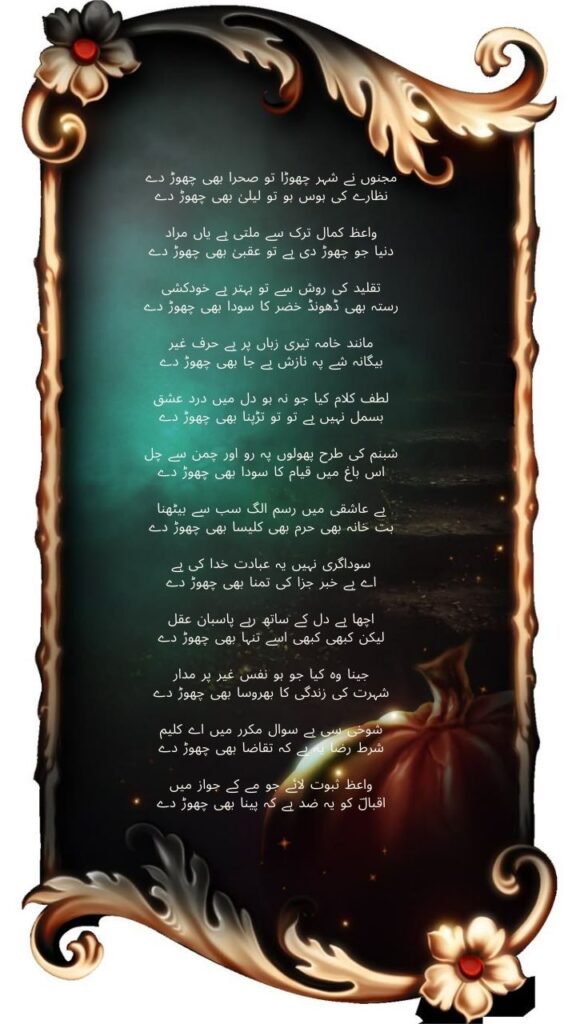
مجنوں نے شہر چھوڑا تو صحرا بھی چھوڑ دے
نظارے کی ہوس ہو تو لیلیٰ بھی چھوڑ دے
واعظ کمال ترک سے ملتی ہے یاں مراد
دنیا جو چھوڑ دی ہے تو عقبیٰ بھی چھوڑ دے
تقلید کی روش سے تو بہتر ہے خودکشی
رستہ بھی ڈھونڈ خضر کا سودا بھی چھوڑ دے
مانند خامہ تیری زباں پر ہے حرف غیر
بیگانہ شے پہ نازش بے جا بھی چھوڑ دے
لطف کلام کیا جو نہ ہو دل میں درد عشق
بسمل نہیں ہے تو تو تڑپنا بھی چھوڑ دے
شبنم کی طرح پھولوں پہ رو اور چمن سے چل
اس باغ میں قیام کا سودا بھی چھوڑ دے
ہے عاشقی میں رسم الگ سب سے بیٹھنا
بت خانہ بھی حرم بھی کلیسا بھی چھوڑ دے
سوداگری نہیں یہ عبادت خدا کی ہے
اے بے خبر جزا کی تمنا بھی چھوڑ دے
اچھا ہے دل کے ساتھ رہے پاسبان عقل
لیکن کبھی کبھی اسے تنہا بھی چھوڑ دے
جینا وہ کیا جو ہو نفس غیر پر مدار
شہرت کی زندگی کا بھروسا بھی چھوڑ دے
شوخی سی ہے سوال مکرر میں اے کلیم
شرط رضا یہ ہے کہ تقاضا بھی چھوڑ دے
واعظ ثبوت لائے جو مے کے جواز میں
اقبالؔ کو یہ ضد ہے کہ پینا بھی چھوڑ دے
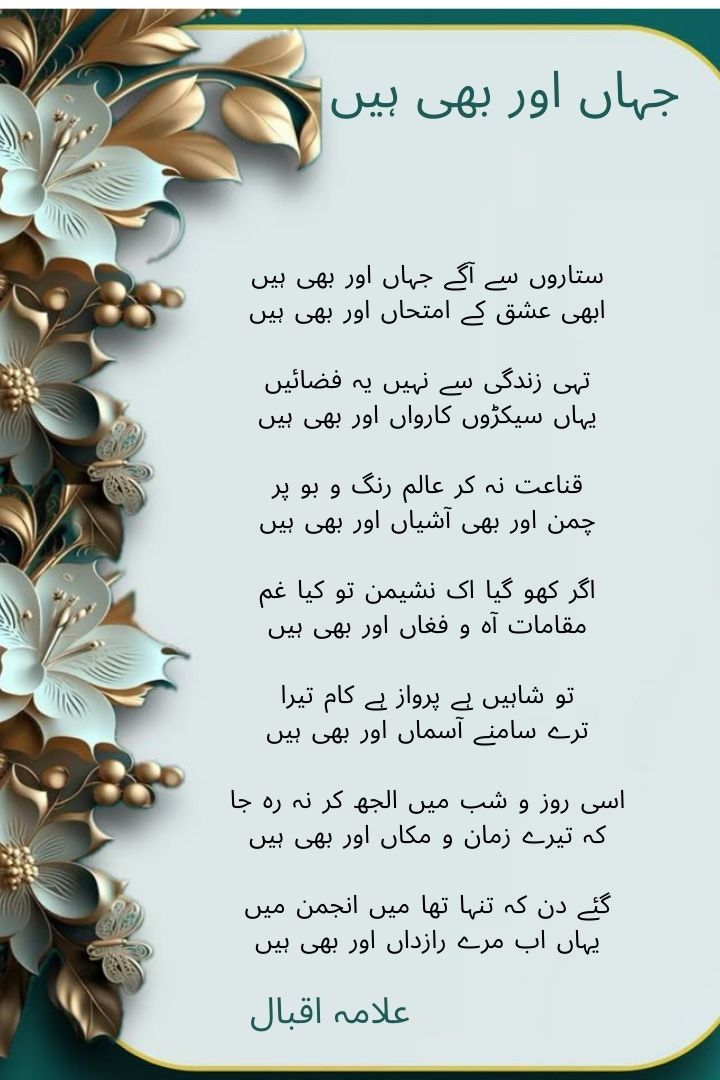
ستاروں سے آگے جہاں اور بھی ہیں
ابھی عشق کے امتحاں اور بھی ہیں
تہی زندگی سے نہیں یہ فضائیں
یہاں سیکڑوں کارواں اور بھی ہیں
قناعت نہ کر عالم رنگ و بو پر
چمن اور بھی آشیاں اور بھی ہیں
اگر کھو گیا اک نشیمن تو کیا غم
مقامات آہ و فغاں اور بھی ہیں
تو شاہیں ہے پرواز ہے کام تیرا
ترے سامنے آسماں اور بھی ہیں
اسی روز و شب میں الجھ کر نہ رہ جا
کہ تیرے زمان و مکاں اور بھی ہیں
گئے دن کہ تنہا تھا میں انجمن میں
یہاں اب مرے رازداں اور بھی ہیں
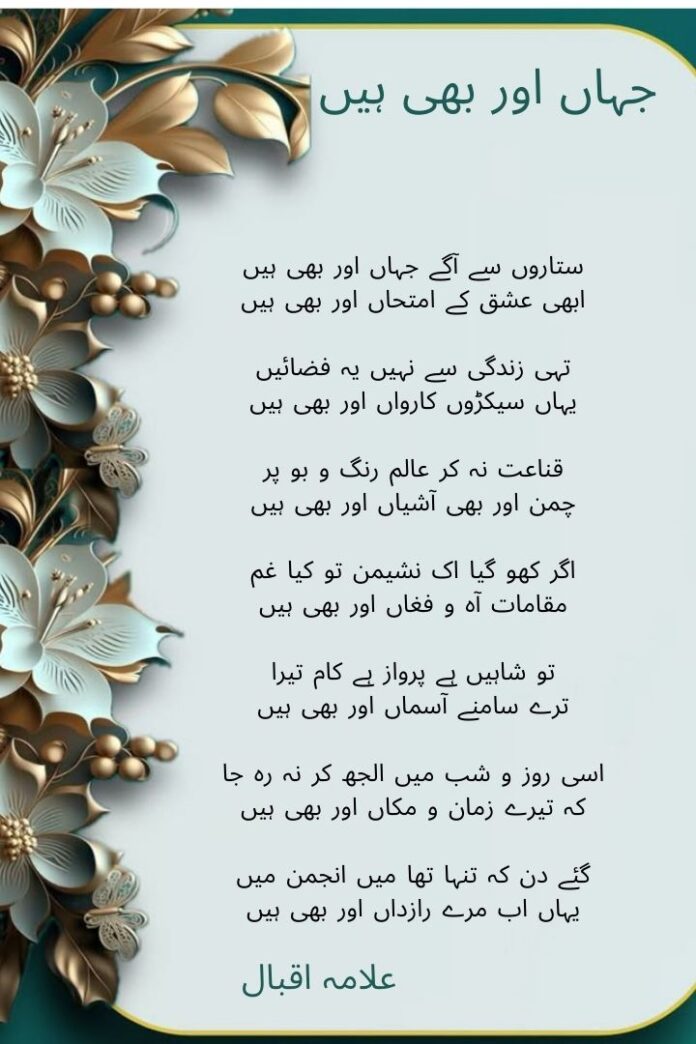
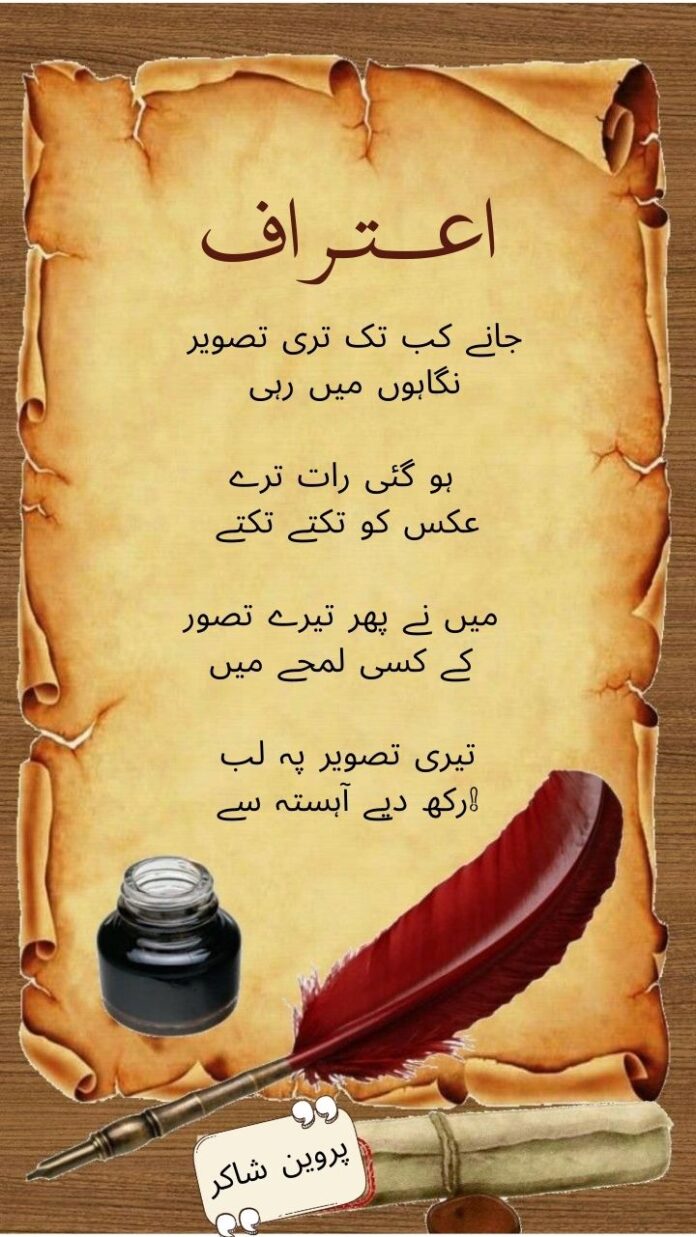
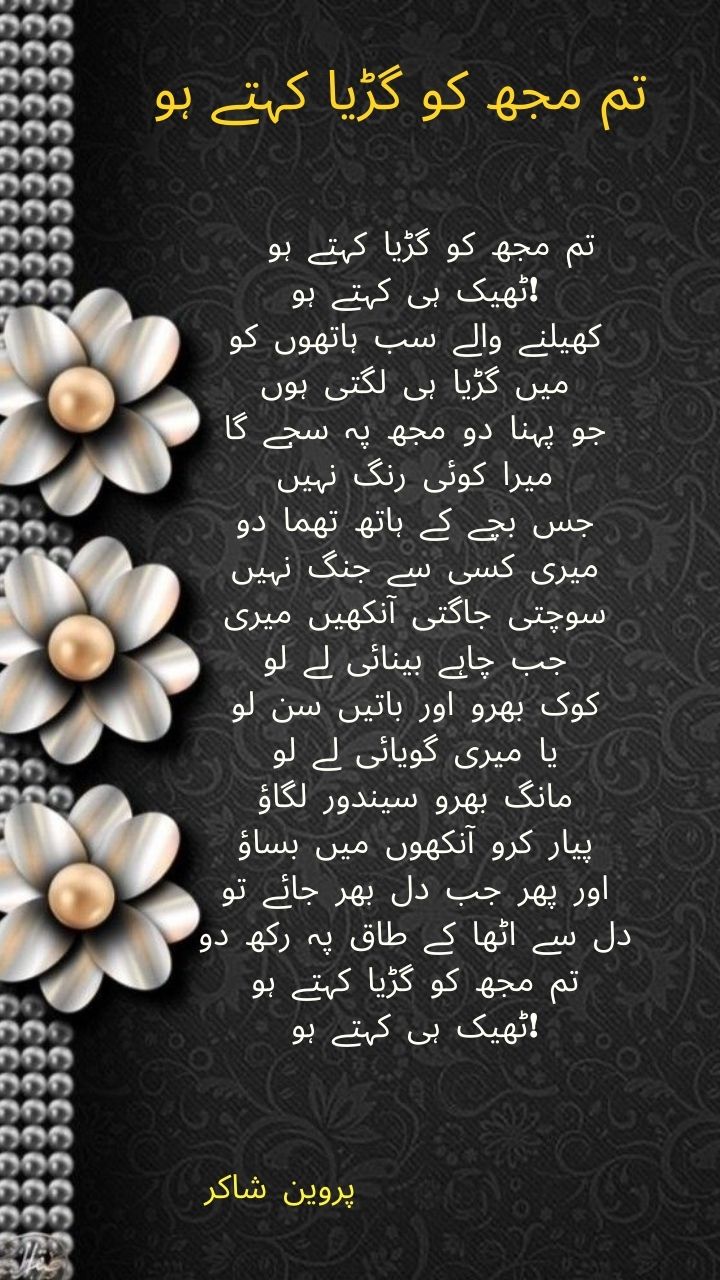
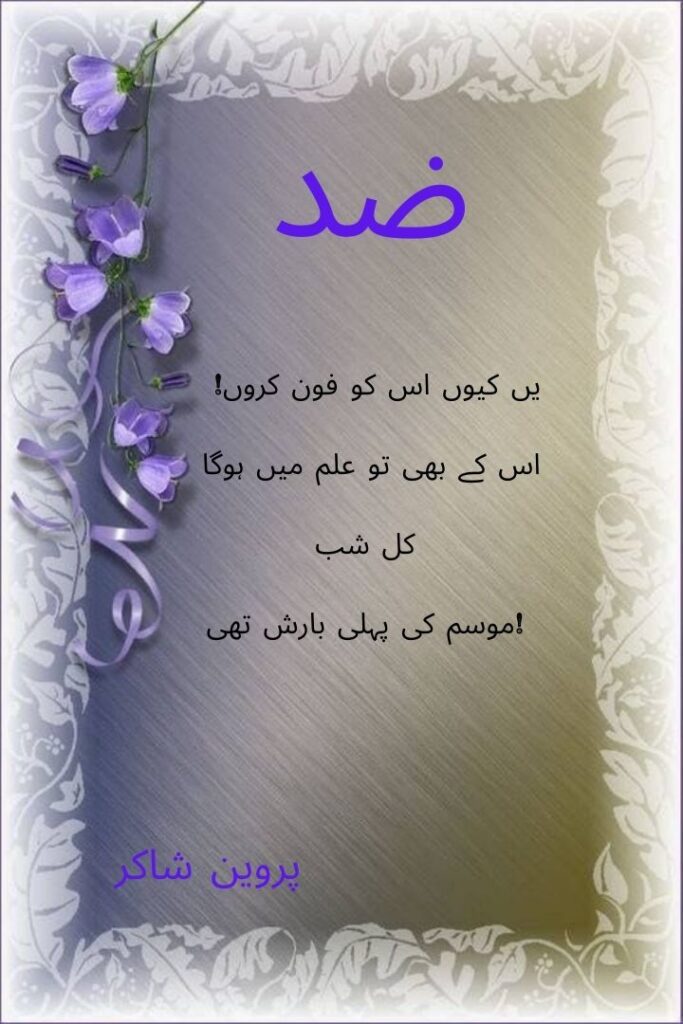


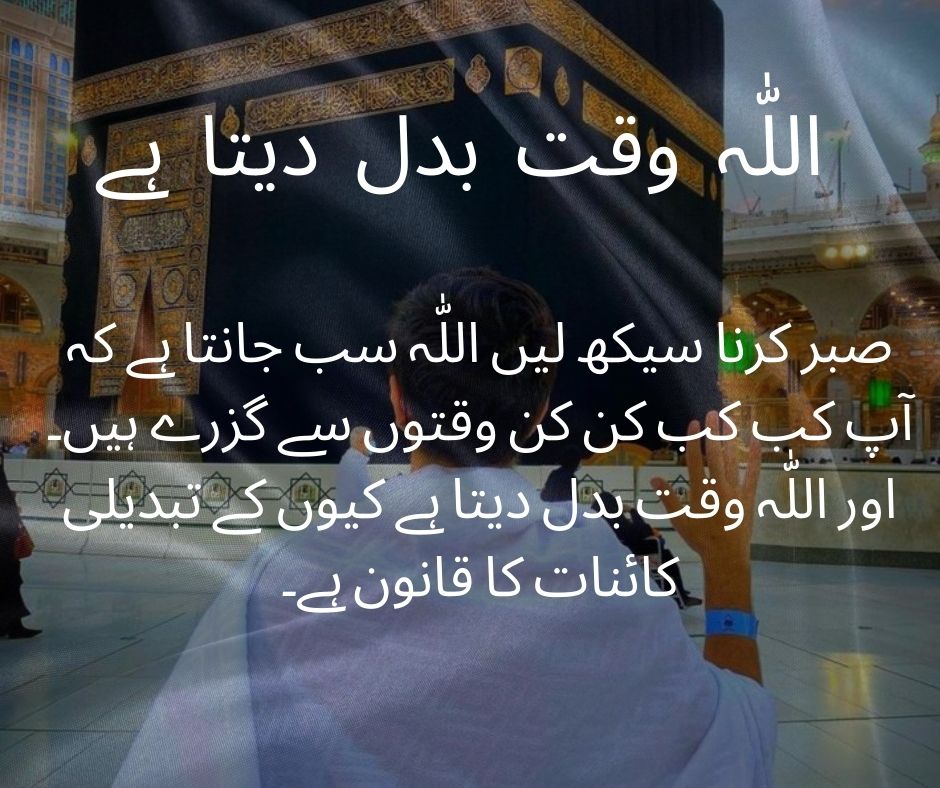 اللّٰہ وقت بدل دیتا ہے
اللّٰہ وقت بدل دیتا ہے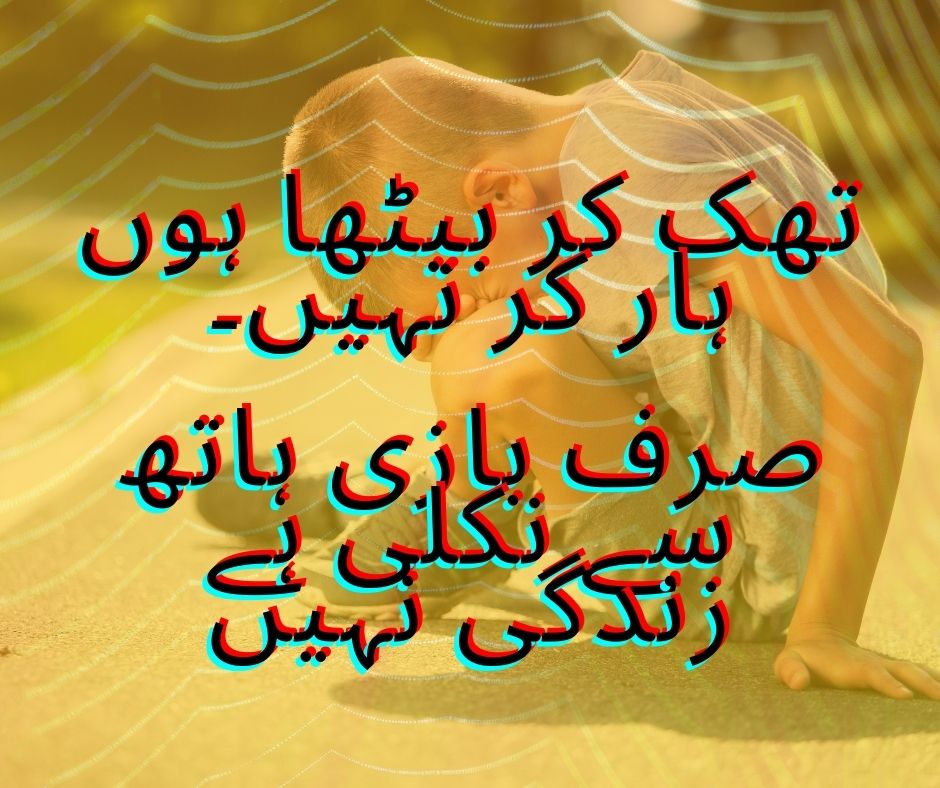 تھک کر بیٹھا ہوں ہار کر نہیں۔
تھک کر بیٹھا ہوں ہار کر نہیں۔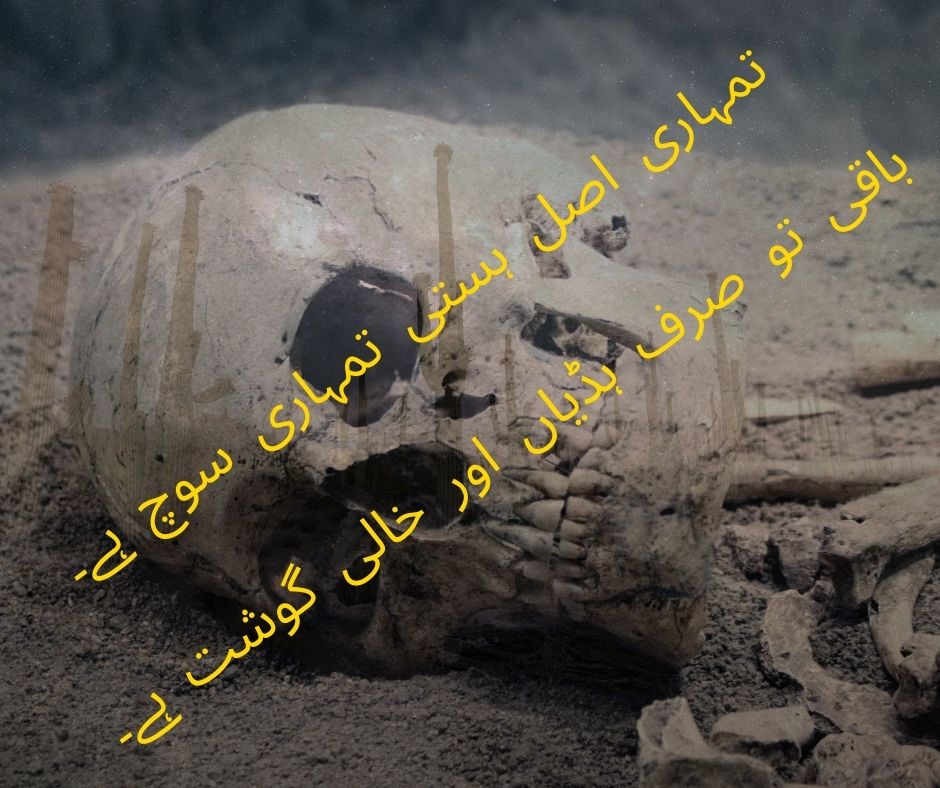 تمہاری اصل ہستی تمہاری سوچ ہے۔
تمہاری اصل ہستی تمہاری سوچ ہے۔
 ہم دونوں کو ہم جیسے بہت ملیں گے
ہم دونوں کو ہم جیسے بہت ملیں گے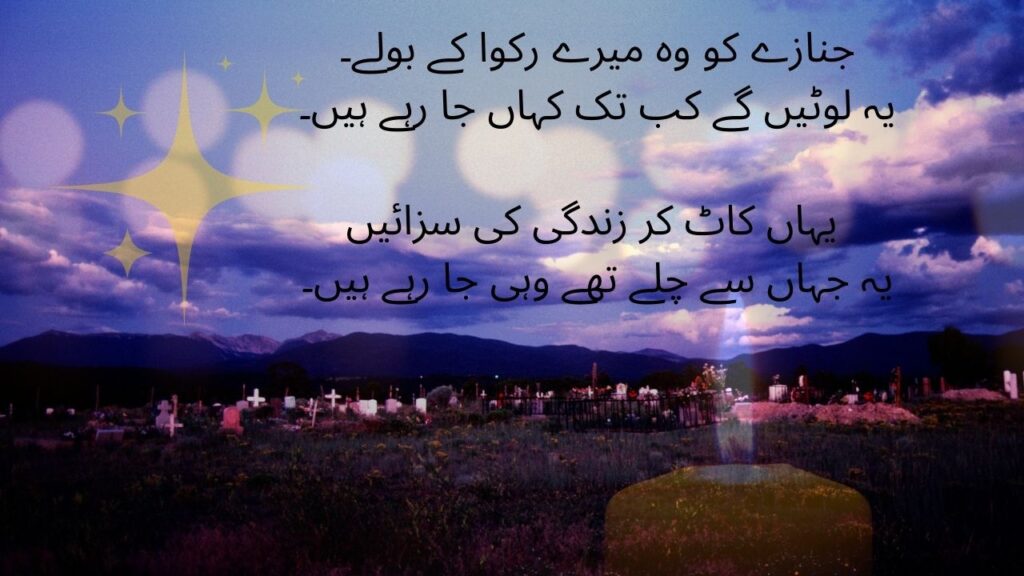
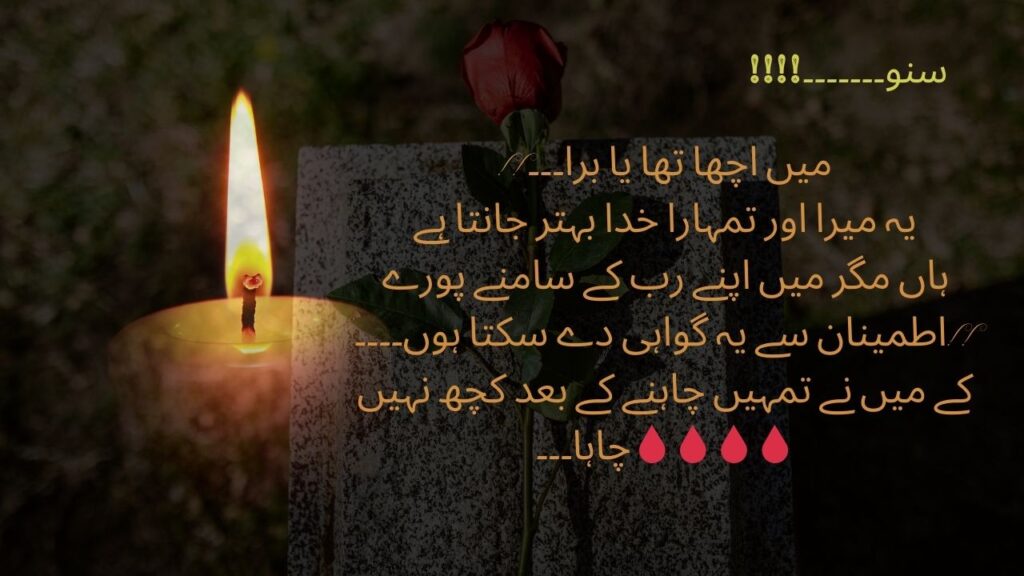 سنو۔۔۔۔۔۔۔!!!!
سنو۔۔۔۔۔۔۔!!!!
 سنو قرار من۔۔۔۔۔۔۔
سنو قرار من۔۔۔۔۔۔۔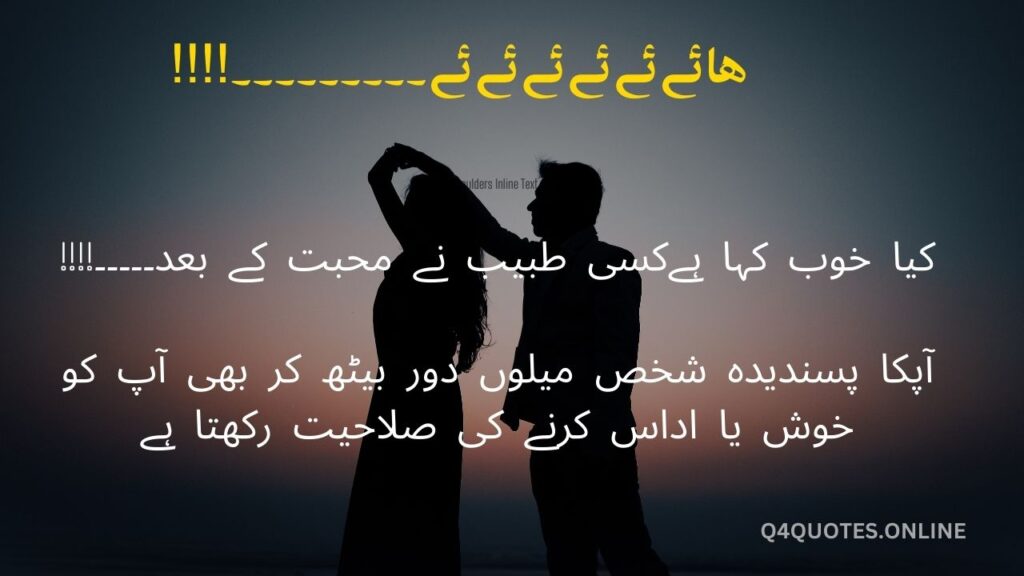 ہائےئےئےئےئےئے۔۔۔۔۔۔۔۔۔!!!!
ہائےئےئےئےئےئے۔۔۔۔۔۔۔۔۔!!!!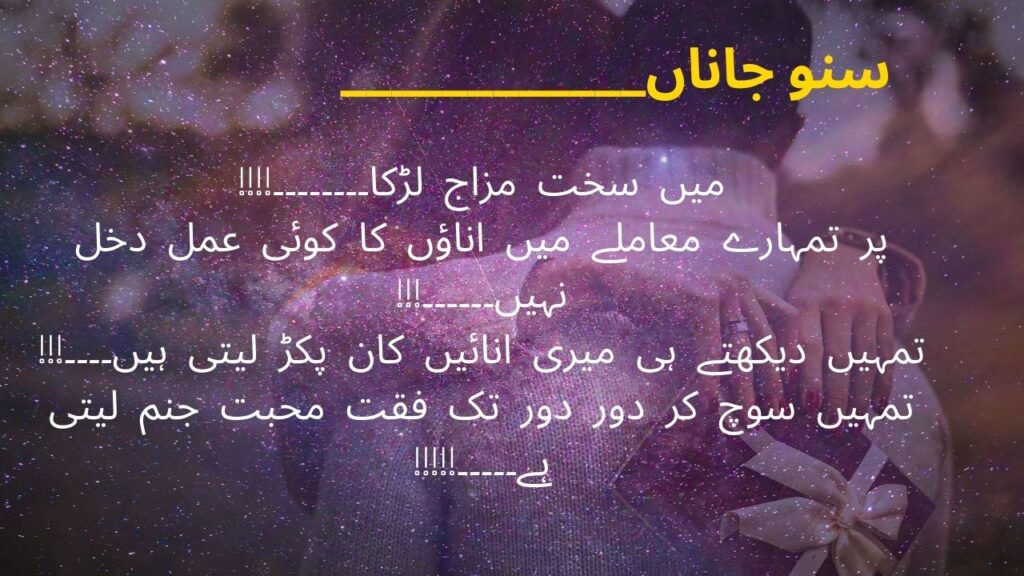 میں سخت مزاج لڑکا۔۔۔۔۔۔۔۔!!!!
میں سخت مزاج لڑکا۔۔۔۔۔۔۔۔!!!!
